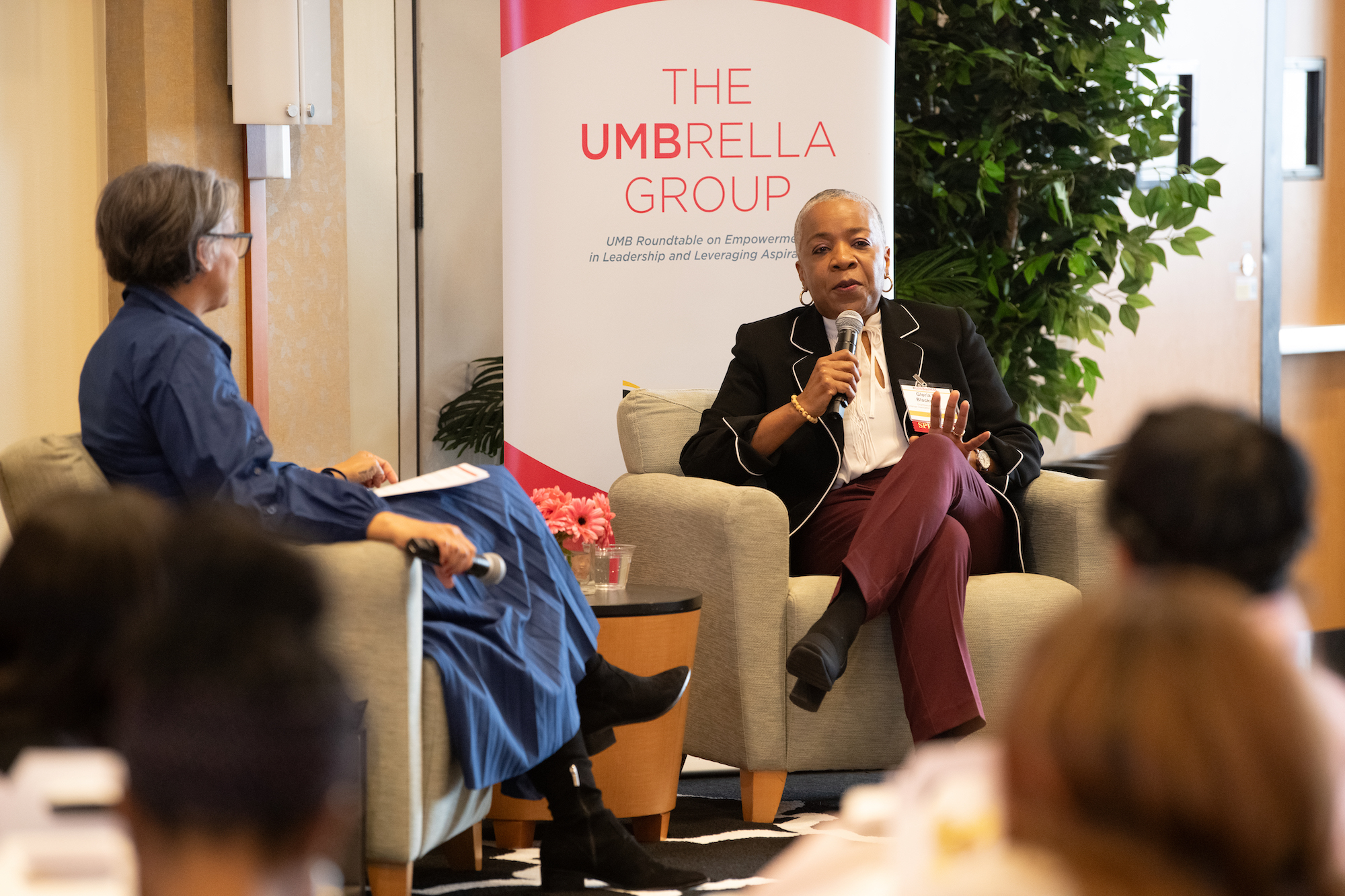Allyship in Action at the 2025 UMBrella Women’s History Month Symposium
March 26, 2025 Lorri Angelloz
This year’s event, “Championing Change: The Role of Allies in Women’s Advancement,” featured two keynotes, breakout sessions, a wellness hour, and a reception to mark UMBrella’s 10th anniversary.
Photo: Afternoon keynote speaker Gloria L. Blackwell, chief executive officer of the American Association of University Women, in conversation with Francis King Carey School of Law Dean Renée Hutchins Laurent.
The University of Maryland, Baltimore (UMB) Women’s History Month Symposium, held on March 13, brought together over 200 women and allies to celebrate and learn. But the daylong event wasn’t just about professional development — it was a call to action. Through powerful conversations, personal reflection, and even laughter, keynote speakers Randi Braun, MA, and Gloria L. Blackwell, MA, challenged the event’s attendees to rethink how they show up for themselves and for each other.
Hosted by the UMBrella Group: UMB Roundtable on Empowerment in Leadership and Leveraging Aspirations, the event featured breakout and wellness sessions in addition to the keynote activities, all centered around the theme "Championing Change: The Role of Allies in Women’s Advancement." Jennifer B. Litchman, MA, UMB’s senior vice president for external relations and founder and chair of UMBrella, reflected on that theme as she welcomed attendees to the event.
“I love seeing so many women here to celebrate Women's History Month and to spend a day of energy and celebration and tribute to women who came before us,” she said. “Just the fact that you're all here today means you all do champion change, and that you are allies.”
The morning kicked off with a keynote address from Braun, chief executive officer and founder of the women’s leadership firm Something Major, who encouraged everyone present to reimagine leadership and longevity through self-care.
“As we think about championing change, as we think about what it means to be an ally, I'm really hoping that we can start the conversation this morning about what it means to be an ally to ourselves,” Braun said.
She went on to explore the barriers that prevent many women from prioritizing their own well-being.
“There are five stories that even the highest performing women tell ourselves that hold us back,” Braun said, before challenging myths surrounding self-care, such as the belief that it is an indulgence or that women should be grateful for what they have rather than advocate for what they need.
Her message: Women must rewrite these narratives to embrace a more fulfilling, sustainable way of living. “Self-care is not a luxurious indulgence — it is a conduit to your performance,” she stressed.
Braun also shared strategies for overcoming guilt and setting boundaries, emphasizing the importance of small but intentional self-care practices. “Think like a telemarketer,” she advised, describing a study by Ashley Whillans, PhD, a professor at Harvard Business School, which found that telemarketers who take small breaks are more productive, have higher satisfaction scores, and are more likely to stay in their roles.
The afternoon keynote conversation featured Blackwell, chief executive officer of the American Association of University Women, an organization that has advocated for gender equity for 142 years. Facilitated by University of Maryland Francis King Carey School of Law Dean Renée Hutchins Laurent, JD, the discussion delved into the evolving landscape of advocacy, the need for authenticity in allyship, and the importance of taking risks despite self-doubt.
Blackwell emphasized that allyship requires mutual respect. “We have to come from a place where you are not looking at those who you feel you support as being someone who is less than you. We look at each other and we consider everyone to have the same potential,” she said. “It is really about how you can support each other.”
She also encouraged women to be proactive in building networks and seeking mentorship. “You don’t need to know all the answers,” she said. “But you do need to be able to say, ‘I’m worthy of having a conversation with this person.’ ”
Reflecting on her own experiences, Blackwell shared how taking on new challenges — even when she wasn’t sure she was ready — helped her grow as a leader. “Taking on that risk is something that I didn’t want to do, but ultimately it became a part of my career,” she noted. “Risks really helped to increase my level of confidence. It also gave me a sense of understanding that I really was enough. I really did have the skills.”